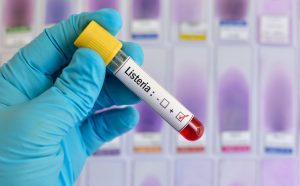
Pregnancy is a beautiful and exciting time, but things don’t always go smoothly. In fact, expectant mothers face numerous dangers. There are many pathogens that, if infected, can have negative impact on the health of the mother and her unborn baby. This also includes infection with listeriosis.
Listeria During Pregnancy and The Possible Risks
Listeria are bacteria that are often found in the environment, for example in sewage, plants or in the soil. In addition, raw fish, meat products such as packaged sausages and raw milk products in particular contain this dangerous pathogen, which is also known as Listeria monocytogenes. Transmission can occur when people eat contaminated food. If a person is infected, one speaks of contracting listeriosis. People who have a healthy immune system generally cope well with the pathogen and usually do not have to fear serious health problems However, older people, people with medical conditions and pregnant women are at higher risk if they contract the infection due to a weakened immune system. Possible symptoms include fever, chills, muscle pain, but also diarrhea, nausea and vomiting.

The main risk for expectant mothers is that they can infect their unborn child. The pathogen can be transmitted through the placenta or during childbirth when amniotic fluid is inhaled. If the child develops listeriosis, premature delivery or stillbirth may occur. Infants can also develop sepsis or meningitis. The chances of survival are significantly higher for the unborn child if an infection occurs in the last trimester of pregnancy. Unfortunately, early detection is difficult. Doctors usually examine the expectant mother’s blood, amniotic fluid or placenta. Treatment is urgent for mother and child and usually requires antibiotic therapy.
Preventive Measures are The Key
Unfortunately, in about 30 percent of cases, despite adequate treatment, the fetus still dies. Therefore it is really important that pregnant women take preventive measures to avoid contracting Listeria. It is strongly recommended not avoid raw milk products, especially soft cheese, and also raw fish. This includes sushi, oysters and mussels. Raw meat such as tartar but also pies, packaged sausages such as salami, opened packs of mayonnaise and green salad should also be avoided.
Moreover it is crucial to practice a good hygiene in the kitchen. If you handle food, you should wash your hands thoroughly with warm water. Clean kitchen towels are a must, as are separate kitchen boards for meat, vegetables and other dishes. Heat meat and fish sufficiently before consumption, clean the refrigerator regularly and keep pets out of the kitchen.
Maternal Immune System May Play a Role in Transmission
Doctors have been puzzled for years as to why pregnant women are 20 times more likely to be infected with the bacterium Listeria monocytogenes than other groups. In their studies with guinea pigs, researchers at the University of California were able to show that the bacteria can invade the placenta, where – protected from the body’s immune system – they proliferate rapidly before pouring out to infect organs such as the liver and spleen. They found that a single bacterium is enough to cause a placental infection.
But why is Listeria able to reach the placenta, the connection between the expectant mother and the fetus that normally prevents transmission of bacteria? Researchers theorize that the inflammation caused by the mother’s immune response to the fast-moving listeria also affects the placenta, preventing it from protecting the fetus. Apparently, the maternal immune system’s attempt to eliminate these bacteria can actually cause collateral damage to the placenta, allowing the bacteria to enter the fetus.
Protection by Gut Bacteria
Researchers at Memorial Sloan Kettering Cancer Center in New York have found that bacteria living in the gut can be a first line of defense against severe listeria infections. Research shows that in risk categories for listeriosis, such as infants or pregnant women, disruptions in the gut microbiome could be a factor in susceptibility to these bacteria.
Pregnant women in the third trimester, the phase in which the susceptibility to Listeria is known to be highest, have an altered microbiome with a significant reduction in Clostridiales species. This study suggests that providing these bacteria in form of probiotics could protect people who are particularly susceptible to listeria, including expectant mothers and cancer patients undergoing chemotherapy.


